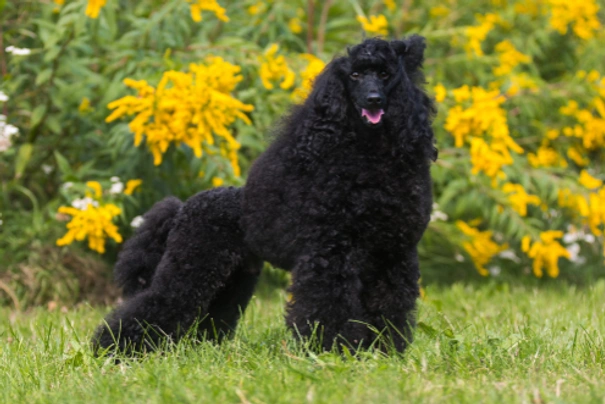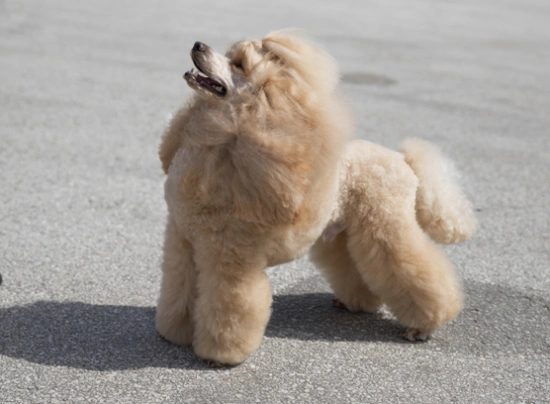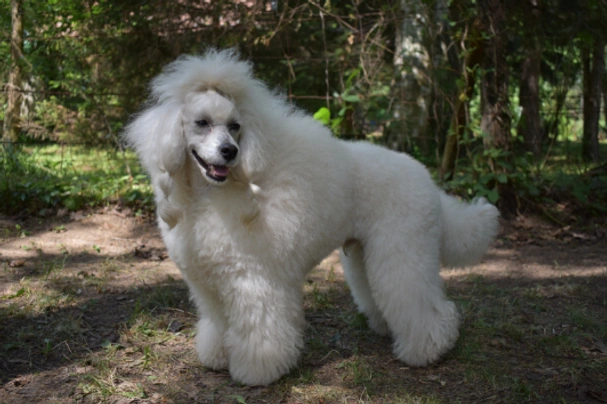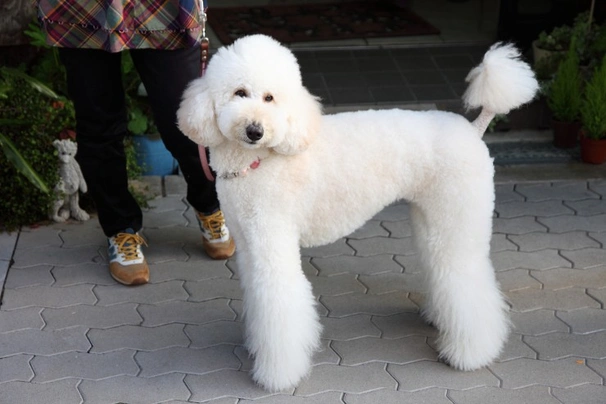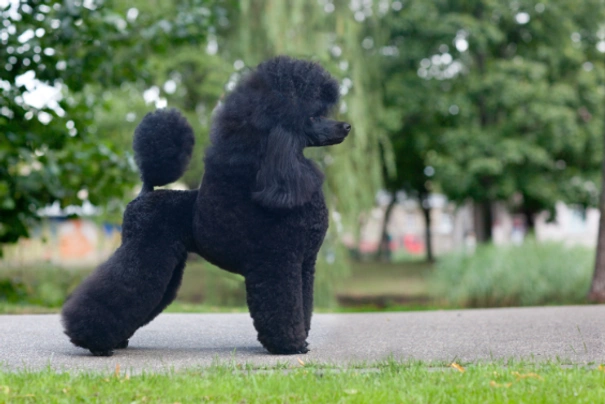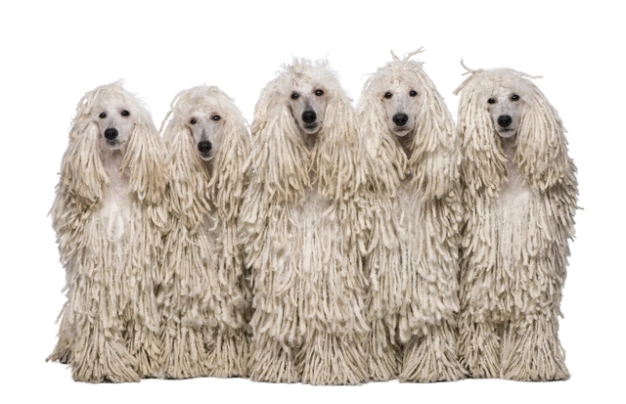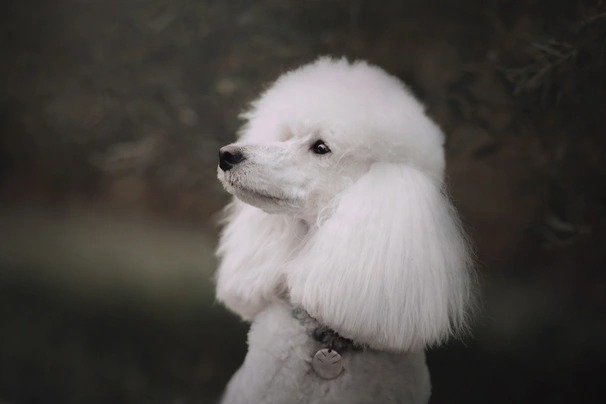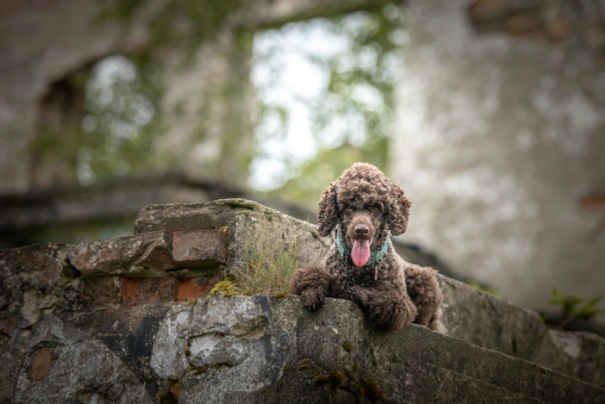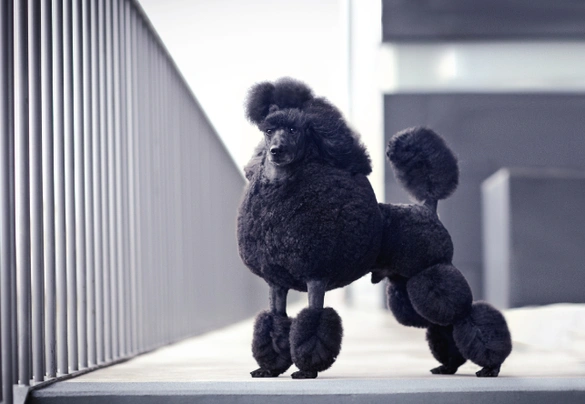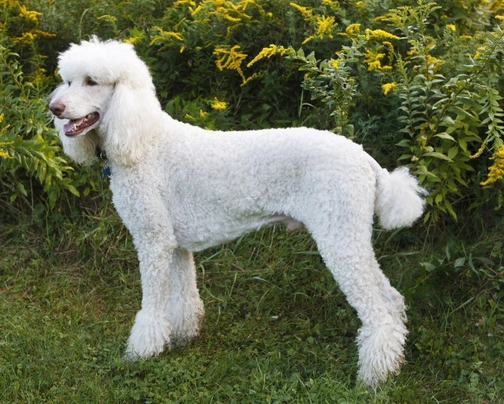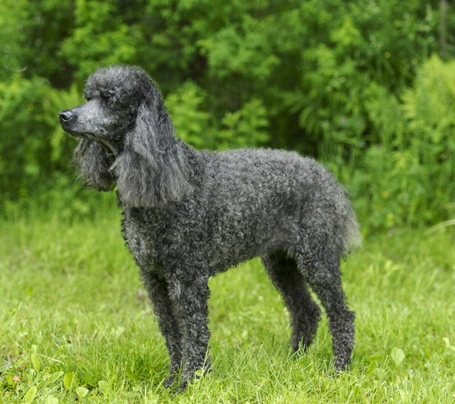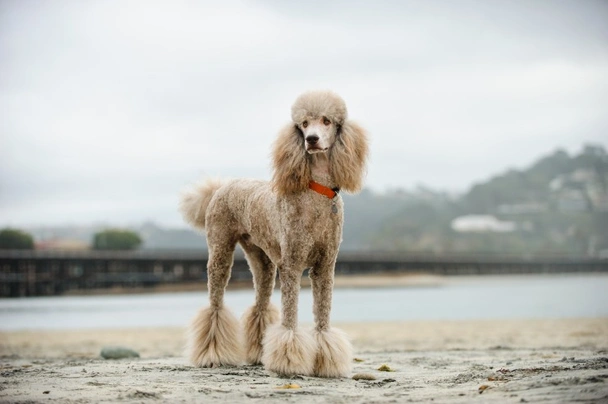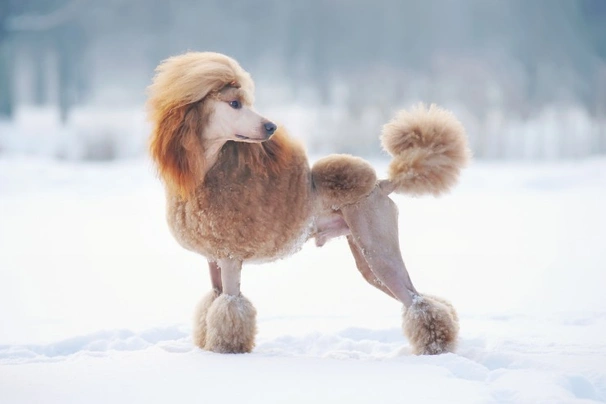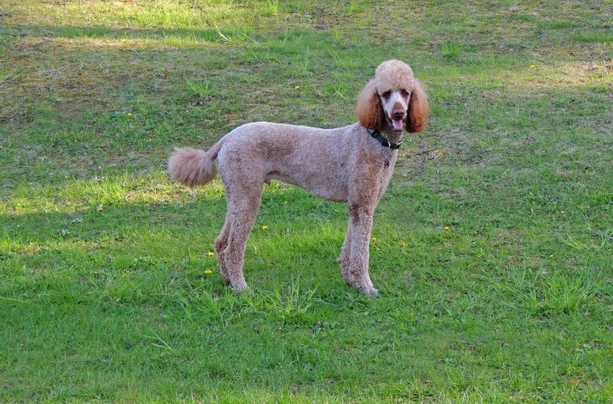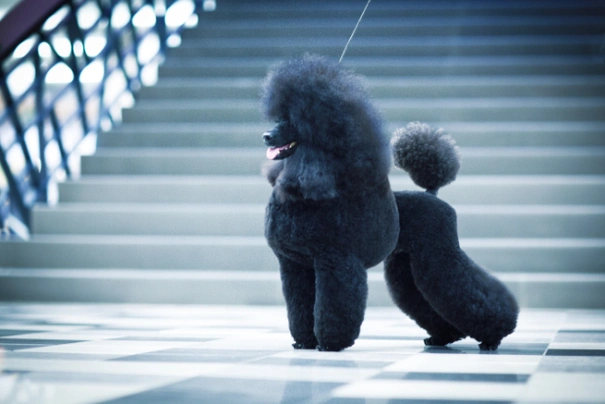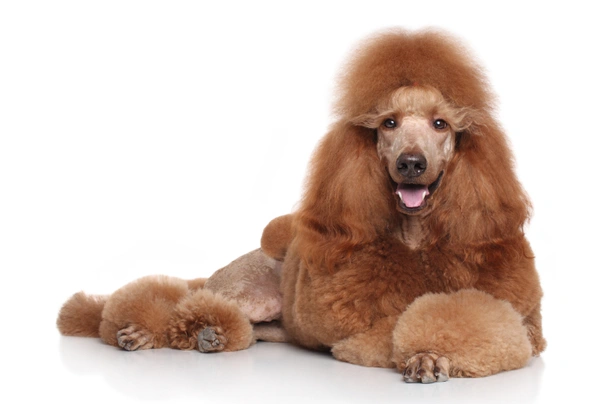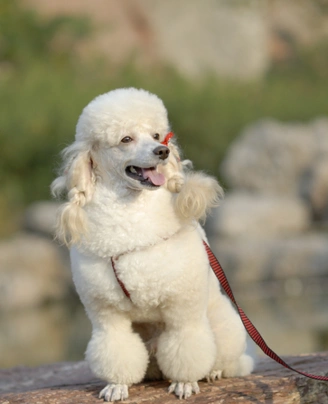Standard Poodle
Pros
Cons
Introduction of the Standard Poodle
Standard Poodles are the largest of their breed, celebrated for their regal and athletic stature, extraordinary intelligence, and affectionate temperament. Originally bred as water retrievers, these versatile dogs have evolved into cherished family companions who combine elegance with exceptional trainability. Their dynamic yet gentle disposition makes them outstanding partners for active households seeking an engaging and loyal canine friend.
Physically, Standard Poodles possess a sleek, muscular build characterised by a dense, curly coat that demands regular grooming to maintain its health and distinctive appearance. Temperamentally, they are alert, gentle, and highly social, forming strong bonds without unnecessary aggression. These qualities, paired with their high intellect, enable them to excel in various roles, from competitive dog sports to therapy and assistance work.
Ideal owners are those who can dedicate time and energy to daily exercise and mental challenges. Families who enjoy an active outdoor lifestyle or experienced handlers familiar with intelligent working breeds will find the Standard Poodle a rewarding companion. Their need for structure and activity means they thrive in environments that offer both physical outlets and cognitive stimulation.
Caring for a Standard Poodle involves consistent grooming routines, early socialisation and training, and ensuring plenty of exercise to keep them healthy and content. Adaptable to both spacious homes and well-managed apartments, they perform best when their energy and intelligence are engaged meaningfully. Their eager-to-please nature combined with sensitivity requires owners to provide firm, positive leadership.
Perfect For
Energetic families or individuals able to support daily walks, interactive play, and mental exercises. Experienced dog owners who value a highly trainable and intelligent breed. Homes with access to secure outdoor spaces for freedom and safe exploration. Those seeking a blend of a capable working dog and an affectionate, social pet.
Key Considerations
The breed requires professional grooming every six to eight weeks to manage its unique coat and prevent mats. Standard Poodles need substantial daily physical and mental stimulation to avoid boredom-related behavioural issues. They can experience separation anxiety if isolated for long durations, thriving on active family involvement. Regular health screening for hereditary conditions and disciplined weight management are vital for their wellbeing.
History of the Standard Poodle
The Standard Poodle originates from Germany, with significant refinement in France, where its distinctive appearance and function as a water retriever were developed. Records dating to the 15th century link the breed to dogs used for retrieving waterfowl from marshes and wetlands, reflecting a heritage tied to hunting and working roles. Their ancestry is believed to combine influences from shepherd dogs introduced from North Africa or Asia, reflecting a complex genetic background that blends resilience and intelligence.
From the 16th century onwards, Standard Poodles have been immortalised in European art, appearing in the works of Albrecht Durer in Germany and Goya in Spain, underscoring their historical popularity among nobility and the aristocracy. Renowned for their curly coat and sharp intellect, they bridged the roles of hunting aid and aristocratic companion.
Early Development
The 19th century saw the breed contribute to the foundation of other breeds such as the Curly-coated Retriever, the Pudelpointer—bred by crossing with the English Pointer—and the Irish Water Spaniel. The Standard Poodle's role as a skilled water retriever became well established, alongside a growing status as a companion dog prized for its elegance and intelligence.
Modern Recognition
Today, the Kennel Club officially recognises the Standard Poodle, which remains a popular choice in the UK and internationally for show, work, and family life. The breed's rich historical roots and versatile nature have cemented its place both in competitive circles and as a beloved household companion.
Appearance of the Standard Poodle
Size and Build
Standard Poodles stand tall and graceful: males reach 56 to 61 cm at the withers, while females range from 51 to 56 cm. Weight for males is typically 29 to 34 kg, with females slightly lighter at 25 to 29 kg. Their athletic, well-proportioned build features a deep, broad chest and well-sprung ribs, a short back with slight curvature, and strong, muscular loins. Forward-set shoulders and straight legs contribute to a poised appearance.
Coat and Colours
Their dense, curly coat offers protection from water and cold rather than thick fur. This coat is coarse to the touch and non-shedding, largely hypoallergenic. Accepted solid colours include apricot, black, blue, brown, cream, red, silver, and white. Traditional clipping styles, such as the Continental and English Saddle clip, highlight the poodle's elegant conformation in dog shows.
Distinctive Features
The Standard Poodle's refined head has a slight peak with a moderate stop. Dark almond-shaped eyes express intelligence and alertness, complemented by low-set ears that lie close to the head with long, broad leather. A full scissor bite defines the jaw. Their tail, thick at the base, is carried straight and away from the body, matching their flowing, light, and driven gait.
Gender Differences
Males are generally larger and more robust with a pronounced muscular frame. Females present a slightly smaller, yet equally elegant, build and tend to display a calmer but spirited temperament. Males may exhibit more dominant behaviour requiring firm, consistent training, while females often demonstrate greater patience. Breed standards emphasise these distinctions for show evaluations.
Temperament of the Standard Poodle
Core Personality Traits
Standard Poodles are among the most intelligent dog breeds, ranking second in canine intelligence studies. They are eager students, highly sensitive to vocal commands, and thrive with structured training. Their playful, energetic nature makes them affectionate family companions who retain youthful enthusiasm well into maturity.
Social Behaviour
When socialised properly, they are friendly toward strangers and other pets, blending alertness with a non-aggressive watchdog demeanor. Their instinct to alert without hostility makes them effective guardians while remaining gentle. Adaptability allows them to live happily in a variety of settings, from bustling family homes to calm adult-only households.
Working Instincts
Bred as retrievers, they maintain strong working drives like a love of water and endurance for active tasks. Their agility and intelligence suit them for canine sports including agility, obedience, and flyball. Although selective breeding has moderated their prey drive, their alert and responsive nature keeps them engaged and ready.
Common Behavioural Challenges
Without sufficient physical and mental enrichment, Standard Poodles can develop undesirable behaviours such as destructive chewing and anxiety. Separation anxiety is a notable risk when left alone too long. Early, ongoing training and socialisation are essential to nurture confident, well-mannered individuals. Positive reinforcement techniques help manage barking tendencies and excessive vocalisation.
Intelligence / Trainability of the Standard Poodle
Known for their exceptional trainability, Standard Poodles quickly respond to commands and enjoy learning complex tasks. Their sensitivity to tone and desire to please build a rewarding bond during training, fostering rapid learning with consistent, positive methods.
Puppy Training Priorities
Training begins immediately on bringing a puppy home, focusing on establishing social boundaries and broad socialisation. Exposure to varied environments, people, and animals helps develop balanced behaviour. Foundational commands such as come, sit, stay, leave it, quiet, and down are prioritised early.
Training Methods That Work
Positive reinforcement, including treats, play, and praise, leverages their motivation to please. Mental stimulation through puzzle toys and varied challenges keeps them engaged and reduces boredom. Harsh methods must be avoided to protect their sensitive disposition.
Advanced Training Potential
Standard Poodles excel in advanced dog sports like agility, obedience, and flyball, and adapt well to roles such as therapy and assistance dogs. Structured, progressive training sustains mental engagement and fulfills their working aptitude.
Common Training Mistakes
Overindulgence due to cuteness can undermine discipline. Insufficient socialisation can trigger fear or aggression issues later. Neglecting mental and physical needs leads to restlessness. Patience, consistency, and early intervention are critical training components during the first six months.
Children and other
Age-Specific Interactions
Standard Poodles are excellent with children, showing patience and playfulness. Their large size requires cautious supervision with toddlers and small children to avoid accidental injuries. Older children and teenagers benefit from the dog's energetic and interactive disposition, often forming strong lifelong bonds.
Teaching Children Proper Interaction
Children should learn respectful handling, avoiding disturbances during rest and refraining from rough play. Recognising canine body language and responding appropriately fosters safe, positive interactions. Supervised introductions and calm behaviour around the dog are essential.
Breed-Specific Considerations
The breed’s size and energy suit active families with older children able to understand structured play. Managing the dog’s exuberance is especially important during early puppyhood and senior years. Grooming sessions can be excellent bonding opportunities with adult guidance.
Creating Safe Environments
Continuous adult supervision during child-dog interactions prevents accidents and stress. Providing the dog a quiet retreat allows decompression. Educating family members on dog behaviour enhances mutual respect and peaceful coexistence.
Health of the Standard Poodle
Breed-Specific Health Conditions
Standard Poodles typically live between 12 to 14 years with good care but are susceptible to several health issues. Notable inherited conditions include Addison's Disease, gastric bloat, liver shunts, lobular dissecting hepatitis, juvenile renal disease, autoimmune disorders, epilepsy, Cushing's syndrome, squamous cell digital carcinoma, neonatal encephalopathy, and atrial septal defects. Skin conditions such as sebaceous adenitis and melanomas, especially in black-coated animals, are concerns. Eye issues including iris atrophy and progressive retinal atrophy also warrant screening.
Genetic Testing Requirements
Recommended health tests include BVA/KC Hip Dysplasia screening, BVA/KC/ISDS Eye Scheme examinations, breed club testing for sebaceous adenitis, and DNA tests for von Willebrand's Disease (vWD type 1) and neonatal encephalopathy. Ethical breeders adhere strictly to these protocols to minimise inherited health risks.
Preventive Healthcare Schedule
Puppies start vaccinations between 10 and 12 weeks, with boosters as advised by vets. Neutering recommendations vary but generally occur between 6 and 12 months. Regular parasite control, health checks, and dental care are integral to long-term health.
Insurance Considerations
Insurance premiums reflect the breed’s known health predispositions, with common claims for bloat, Addison’s Disease, and skin conditions. Prospective owners are advised to secure comprehensive policies covering hereditary illnesses and specialized treatments to safeguard their pet’s wellbeing.
Caring for the Standard Poodle
Keeping a Standard Poodle healthy demands dedication to grooming, balanced nutrition, and regular physical and mental activity. Their curly coat requires vigilant maintenance to prevent mats and protect skin health while daily exercise supports their muscular build and lively temperament.
Daily Care Routine
A typical day includes brisk morning walks or play to expend energy, followed by feeding balanced meals appropriate to the dog’s age and activity. Regular grooming, including brushing and ear inspections, complements health checks. Mental stimulation via training or interactive toys is essential to prevent boredom-related behaviour.
Living Environment Needs
While capable of adapting to flat living if sufficiently exercised, Standard Poodles excel in homes with secure outdoor spaces. They tolerate moderate climates well but need protection from extreme heat or cold to safeguard skin and general health.
Seasonal Care Adjustments
Summer requires vigilance to prevent heatstroke and maintain skin hydration. Winter benefits from their water-resistant coat, though additional warmth and moisture management may be necessary. Ear cleaning routines help combat humidity-related infections.
Senior Care Adaptations
Older dogs need modified exercise to accommodate reduced stamina and joint health. Dietary adjustments maintain ideal body weight, and arthritis management supports mobility. Comfortable bedding and gentle grooming keep seniors comfortable and relaxed.
Grooming of the Standard Poodle
Standard Poodles have high-maintenance grooming needs best managed by professional groomers every six to eight weeks. Their distinctive curly coat does not shed significantly, making them a good choice for allergy sufferers but demanding consistent coat care to prevent matting and skin issues.
Coat Maintenance Schedule
Daily brushing with slicker brushes and grooming gloves is essential to avoid tangles and maintain coat texture. Weekly skin and ear checks help early identification of problems. Monthly baths with hypoallergenic dog shampoos support coat condition.
Professional Grooming Requirements
Routine visits to experienced groomers ensure breed-standard clipping styles, including the Continental and English Saddle clip, are maintained. Grooming sessions also include ear hair plucking, nail trimming, and dental care to promote overall health.
Home Grooming Techniques
Between professional appointments, owners should perform gentle brushing and spot cleaning with proper tools, with instruction from groomers recommended. Attention to sensitive skin and coat is critical to avoid damage.
Common Grooming Challenges
Neglected grooming leads to painful mats and skin infections. Sensitive skin requires gentle, hypoallergenic products. Seasonal dead skin shedding necessitates extra grooming vigilance to maintain skin health.
Exercise of the Standard Poodle
Standard Poodles are active and intelligent dogs, requiring at least an hour of vigorous daily exercise to stay healthy and happy. Their historical water retriever background means they benefit greatly from swimming and other endurance activities.
Daily Exercise Requirements
At minimum, daily routines should include brisk walks, interactive play, and training sessions to expend both physical and mental energy. Puppies require shorter, carefully monitored sessions appropriate to their growth stages.
Suitable Activities
The breed thrives in agility, obedience, flyball, and swimming, activities that engage both body and mind. These pursuits satisfy working drives and maintain fitness.
Exercise Restrictions
Puppies must have limited high-impact activity to protect developing joints and bones. Caution is advised during extreme weather: avoid midday heat and severe cold, adapting timing and intensity accordingly.
Mental Stimulation Ideas
Food puzzles, scent trails, and trick training provide enriching mental challenges. Rotation of toys and structured games aid in avoiding boredom and destructive behaviours.
Feeding of the Standard Poodle
Nutritional Requirements
Standard Poodles require a high-quality, balanced diet adjusted for age, weight, and activity levels. Protein content ideally ranges from 18-25%, with fat at 10-15% to sustain muscle mass and energy demands. Caloric intake should be monitored carefully to prevent obesity, especially in neutered or less active adults.
Feeding Schedule Guidelines
Puppies benefit from three to four small meals daily, transitioning to two well-portioned meals in adulthood. Avoid large meals immediately before or after vigorous exercise to reduce gastric bloat risk.
Special Dietary Considerations
Some Standard Poodles develop skin sensitivities requiring hypoallergenic or novel protein diets. Omega fatty acid supplements can improve coat and skin condition. Veterinary consultation is advised for tailored feeding plans and allergy management.
Weight Management
Maintaining optimal body condition through portion control and exercise is critical. Owners should regularly assess body shape and weight to prevent obesity-related health problems prevalent in the breed.
Standard Poodle price
Standard Poodles typically range in price from £700 to £1,500 depending on breeder type and pedigree quality. Licensed breeders usually ask for prices closer to £1,100, reflecting health screening and breed conformity, while individual breeders offer slightly lower rates, typically around £700 to £1,200. Variations can occur based on coat colour rarity and breeder reputation.
Initial setup costs—including quality grooming tools, safe toys, bedding, and home-proofing—usually amount to £200-£400. Monthly outgoings average between £80 and £120, covering premium food, grooming appointments, insurance, and routine veterinary care.
Pet insurance costs vary widely, with basic monthly premiums starting around £22 and comprehensive lifetime coverage up to £47. Due to their predisposition to conditions like Addison’s disease and bloat, inclusive insurance policies are advisable.
Prospective owners should budget carefully for the lifetime costs involving grooming, medical care, nutrition, and training. To explore current availability and connect with reputable breeders, you can find Standard Poodle for sale on Pets4Homes.
Buying advice
Purchasing a Standard Poodle requires thorough research and attention to ethical breeding standards due to the breed's popularity and associated health considerations. Prospective owners should prioritise health, temperament, and responsible breeding practices.
Finding Ethical Breeders
Seek breeders registered with the Kennel Club Assured Breeder Scheme to ensure adequate health testing and living conditions. Visiting breeder facilities to observe puppies and meet parents offers insight into care standards. Enquire about socialisation programs and puppy health protocols.
Health Testing Verification
Request documentation of comprehensive health screenings including BVA/KC Hip Dysplasia records, Eye Scheme certificates, sebaceous adenitis tests, and DNA screening for von Willebrand's Disease (vWD). These measures reduce the risk of genetic diseases in puppies.
Puppy Selection Process
Evaluate puppies for alertness, social skills, and health markers such as clear eyes and clean ears. Ethical breeders support careful puppy-to-owner matching and provide guidance for care and training.
Contract and Guarantee Review
Ensure contracts include health guarantees, return policies, and microchipping details. Watch for warning signs such as pressure to purchase without a visit or unusually low prices that may indicate unethical practices.
Rescue and Adoption Options
Consider Standard Poodle rescue organisations when seeking mature dogs needing rehoming. Adoption can be a meaningful option for those prepared to provide patient care and re-socialisation. You can find Standard Poodle for sale on Pets4Homes to explore both puppies and rescues.
